- Home
- Victor Hugo
The Complete Novels of Victor Hugo Page 3
The Complete Novels of Victor Hugo Read online
Page 3
An enormous alligator, whose body was half concealed by the reeds and water plants, had thrust his monstrous head through one of the leafy sides of the summer-house; his hideous, widely-opened mouth threatened a young negro of colossal height, who with one arm sustained Marie's fainting form, while with the other he had plunged the iron portion of a hoe between the sharp and pointed teeth of the monster. The reptile struggled fiercely against the bold and courageous hand that held him at bay.
As I appeared at the door, Marie uttered a cry of joy, and extricating herself from the support of the negro, threw herself into my arms with, “I am saved! I am saved!”
At the movement and exclamation of Marie the negro turned abruptly round, crossed his arms on his breast, and casting a look of infinite sorrow upon my betrothed, remained immovable, taking no heed of the alligator, which, having freed itself from the hoe, was advancing on him in a threatening manner. There would have been a speedy end of the courageous negro had I not rapidly placed Marie on the knees of her nurse (who, more dead than alive, was gazing upon the scene), and coming close to the monster, discharged my carbine into its yawning mouth. The huge reptile staggered back, its bleeding jaws opened and shut convulsively, its eyes closed; and after one or two unavailing efforts it rolled over upon its back, with its scaly feet stiffening in the air. It was dead.
The negro whose life I had so happily preserved turned his head, and saw the last convulsive-struggles of the monster; then he fixed his eyes upon Marie, who had again cast herself into my arms, and in accents of the deepest despair, he exclaimed in Spanish, “Why did you kill him?” and without waiting for a reply leaped into the thicket and disappeared.
CHAPTER SIX
THE terrible scene, its singular conclusion, the extraordinary mental emotions of every kind which had accompanied and followed my vain researches in the wood, had made my brain whirl. Marie was still stupefied with the danger that she had so narrowly escaped, and some time elapsed before we could frame coherent words, or express ourselves otherwise than by looks and clasping of the hands.
At last I broke the silence: “Come, Marie, let us leave this; some fatality seems attached to the place.”
She rose eagerly, as if she had only been waiting for my permission to do so, and leaning upon my arm, we quitted the pavilion. I asked her how it had happened that succor had so opportunely arrived when the danger was so imminent, and if she knew who the slave was who had come to her assistance; for that it was a slave was shown by his coarse linen trousers —a dress only worn by that unhappy class.
“The man,” replied Marie, “is no doubt one of my father's negroes, who was at work in the vicinity when the appearance of the alligator made me scream; and my cry must have warned him of my danger. All I know is, that he rushed out of the wood and came to my help.”
“From which side did he come?” asked I.
“From the opposite side from which the song came, and into which you had just gone.”
This statement upset the conclusion that I had been drawing from the Spanish words that the negro had addressed to me, and from the song in the same language by my unknown rival. But yet there was a crowd of other similarities. This negro of great height and powerful muscular development might well have been the adversary with whom I had struggled on the preceding night. In that case his half-clothed person would furnish a striking proof. The singer in the wood had said, “I am black”—a further proof. He had declared himself to be a king, and this one was only a slave; but I recollected that in my brief examination I had been surprised at the noble appearance of his features, though of course accompanied by the characteristic signs of the African race.
The more that I thought of his appearance, the nobleness of his deportment, and his magnificent proportions, I felt that there might be some truth in his statement that he had been a king. But then came the crushing blow to my pride: if he had dared to gaze with an eye of affection upon Marie, if he had made her the object of his serenades— he, a negro and a slave — what punishment could be sufficiently severe for his presumption? With these thoughts all my indecision returned again, and again my anger increased against the mysterious unknown. But t at the moment that these ideas filled my brain, Marie dissipated them entirely by exclaiming, in her gentle voice:
“My Leopold, we must seek out this brave negro, and pay him the debt of gratitude that we owe him; for without him I should have been lost, for you would have arrived too late.”
These few words had a decisive effect. They did not alter my determination to seek out the slave, but they entirely altered the design with which I sought him; for it was to recompense and not to punish him that I was now eager.
My uncle learned from me that he owed his daughter's life to the courage of one of his slaves, and he promised me his liberty as soon as I could find him out.
CHAPTER SEVEN
Up to that time my feelings had restrained me from going into those portions of the plantation where the slaves were at work; it had been too painful for me to see so much suffering which I was powerless to alleviate. But on the day after the events had taken place which I have just narrated, upon my uncle asking me to accompany him on his tour of inspection, I accepted his proposal with eagerness, hoping to meet among the laborers the preserver of my much-beloved Marie.
I had the opportunity in this visit of seeing how great a power the master exercises over his slaves, but at the same time I could perceive at what a cost this power was bought; for though at the presence of my uncle all redoubled their efforts, I could perceive that there was as much hatred as terror in the looks that they furtively cast upon him.
Irascible by temperament, my uncle seemed vexed at being unable to discover any object upon which to vent his wrath, until Habibrah the buffoon, who was ever at his heels, pointed out to him a young negro, who, overcome by heat and fatigue, had fallen asleep under a clump of date-trees. My uncle stepped quickly up to him, shook him violently, and in angry tones ordered him to resume his work.
The terrified slave rose to his feet, and in so doing disclosed a Bengal rose-tree upon which he had accidentally lain, and which my uncle prized highly. The shrub was entirely destroyed.
At this the master, already irritated at what he called the idleness of his slave, became furious. Foaming with rage, he unhooked from his belt the whip with wire-plaited thongs which he always carried with him on his rounds, and raised his arm to strike the negro who had fallen at his feet.
The whip did not fall. I shall, as long as I live, never forget that moment. A powerful grasp arrested the hand of the angry planter, and a negro (it was the very one that I was in search of) exclaimed, “Punish me, for I have offended you; but do not hurt my brother, who has but broken your rose-tree.”
This unexpected interposition from the man to whom I owed Marie's safety, his manner, his look, and the haughty tone of his voice, struck me with surprise. But his generous intervention, far from causing my uncle to blush for his causeless anger, only increased the rage of the incensed master, and turned his anger upon the newcomer.
Exasperated to the highest pitch, my uncle disengaged his arm from the grasp of the tall negro, and pouring out a volley of threats, again raised the whip to strike the first victim of his anger.
This time, however, it was torn from his hand, and the negro, breaking the handle studded with iron nails as you would break a straw, cast it upon the ground and trampled upon the instrument of degrading punishment.
I was motionless with surprise, my uncle with rage; for it was an unheard-of thing for him to find his authority thus contemned. His eyes appeared ready to start from their sockets, and his lips quivered with passion.
The negro gazed upon him calmly, and then, with a dignified air, he offered him an ax that he held in his hand. “White man,” said he, “if you wish to strike me, at least take this ax.”
My uncle, beside himself with rage, would certainly have complied with the request, for he stretched out his hand t
o grasp the dangerous weapon; but I in my turn interfered, and seizing the ax threw it into the well of a sugar-mill which was close at hand.
“What have you done?” asked my uncle, angrily.
“I have saved you,” answered I, “from the unhappiness of striking the preserver of your daughter. It is to this slave that you owe Marie; it is the negro to whom you have promised liberty.”
It was an unfortunate moment in which to remind my uncle of his promise. My words could not soothe the wounded dignity of the planter.
“His liberty!” replied he, savagely. “Yes, he has deserved that an end should be put to his slavery. His liberty indeed! we shall see what sort of liberty the members of a court-martial will accord him.”
These menacing words chilled my blood. In vain did Marie later join her entreaties to mine. The negro whose negligence had been the cause of this scene was punished with a severe flogging, while his defender was thrown into the dungeons of Fort Galifet, under the terrible accusation of having assaulted a white man. For a slave who did this; the punishment was invariably death.
CHAPTER EIGHT
You may judge, gentlemen, how much all these circumstances excited my curiosity and interest. I made every inquiry regarding the prisoner, and some strange particulars came to my knowledge. I learned that all his comrades displayed the greatest respect for the young negro. Slave as he was, he had but to make a sign to be implicitly obeyed. He was not born upon the estate, nor did any one know his father or mother: all that was known of him was that some years ago a slave ship had brought him to St. Domingo. This circumstance rendered the influence which he exercised over the slaves the more extraordinary, for as a rule the negroes born upon the island profess the greatest contempt for the Congos —a term which they apply to all slaves brought direct from Africa.
Although he seemed a prey to deep dejection, his enormous strength, combined with his great skill, rendered him very valuable in the plantation. He could turn more quickly, and for a longer period, than a horse the wheels of the sugar-mills, and often in a single day performed the work of ten of his companions to save them from the punishment to which their negligence or incapacity had rendered them liable. For this reason he was adored by the slaves; but the respect that they paid him was of an entirely different character from the superstitious dread with which they looked upon Habibrah the Jester.
What was more strange than all was the modesty and gentleness with which he treated his equals, in contrast to the pride and haughtiness which he displayed to the negroes who acted as overseers. These privileged slaves, the intermediary links in the chain of servitude, too often exceed the little brief authority that is delegated to them, and find a cruel pleasure in overwhelming those beneath them with work. Not one of them, however, had ever dared to inflict any species of punishment on him, for had they done so, twenty negroes would have stepped forward to take his place, while he would have looked gravely on, as though he considered that they were merely performing a duty. The strange being was known throughout the negro quarter as Pierrot.
CHAPTER NINE
THE whole of these circumstances took a firm hold upon my youthful imagination. Marie, inspired by compassion and gratitude, applauded my enthusiasm; and Pierrot excited our interest so much that I determined to visit him and offer him my services in extricating him from his perilous position. As the nephew of one of the richest colonists in the Cap, I was, in spite of my youth, a captain in the Acul Militia. This regiment, and a detachment of the Yellow Dragoons, had charge of Fort Galifet; the detachment was commanded by a non-commissioned officer, to whose brother I had once had the good fortune to render an important service, and who therefore was entirely devoted to me.
[Here the listeners at once pronounced the name of Thaddeus.]
You are right, gentlemen; and as you may well believe, I had not much trouble in penetrating to the cell in which the negro was confined. As a captain in the militia, I had of course the right to visit the fort; but to evade the suspicions of my uncle, whose rage was still unabated, I took care to go there at the time of his noonday siesta. All the soldiers too, except those on guard, were asleep, and guided by Thaddeus I came to the door of the cell. He opened it for me, and then discreetly retired.
The negro was seated on the ground, for on account of his height he could not stand upright. He was not alone; an enormous dog was crouched at his feet, which rose with a growl, and moved toward me.
“Rask!” cried the negro.
The dog ceased growling, and again lay down at his master's feet, and began eating some coarse food.
I was in uniform, and the daylight that came through the loophole in the wall of the cell was so feeble that Pierrot could not recognize my features.
“I am ready,” said he, in a clear voice.
“I thought,” remarked I, surprised at the ease with which he moved, “that you were in irons.”
He kicked something that jingled.
“Irons; oh, I broke them!”
There was something in the tone in which he uttered these words that seemed to say, “I was not born to wear fetters.”
I continued: “I did not know that they had permitted you to have a dog with you.”
“They did not allow it; I brought him in.”
I was more and more astonished. Three bolts closed the door on the outside, the loophole was scarcely six inches in width, and had two iron bars across it.
He seemed to divine my thoughts, and rising as nearly erect as the low roof would permit, he pulled out with ease a large stone placed under the loophole, removed the iron bars, and displayed an opening sufficiently large to permit two men to pass through. This opening looked upon a grove of bananas and cocoanut trees which covered the hill upon which the fort was built.
Surprise rendered me dumb; at that moment a ray of light fell on my face. The prisoner started as if he had accidentally trodden upon a snake, and his head struck against the ceiling of the cell. A strange mixture of opposing feelings passed over his face—hatred, kindness, and astonishment being all mingled together; but recovering himself with an effort, his face once more became cold and calm, and he gazed upon me as if I was entirely unknown to him.
“I can live two days more without eating,” said he.
I saw how thin he had become, and made a movement of horror.
He continued: “My dog will only eat from my hand, and had I not enlarged the loophole, poor Rask would have died of hunger. It is better that he should live, for I know that I am condemned to death.”
“No,” I said; “no, you shall not die of hunger.”
He misunderstood me. “Very well,” answered he, with a bitter smile, “I could have lived two days yet without food, but I am ready: to-day is as good as to-morrow. Do not hurt Rask.”
Then I understood what he meant when he said “I am ready.” Accused of a crime the punishment for which was death, he believed that I had come to announce his immediate execution; and yet this man endowed with herculean strength, with all the avenues of escape open to him, had in a calm and childlike manner repeated, “I am ready!”
“Do not hurt Rask,” said he, once more.
I could restrain myself no longer. “What!” I exclaimed, “not only do you take me for your executioner, but you think so meanly of my humanity that you believe I would injure this poor dog, who has never done me any harm!”
His manner softened, and there was a slight tremor in his voice as he offered me his hand, saying, “White man, pardon me; but I love my dog, and your race have cruelly injured me.”
I embraced him, I clasped his hand, I did my best to undeceive him. “Do you not know me?” asked I.
“I know that you are white, and that a negro is nothing in the eyes of men of your color; besides, you have injured me.”
“In what manner?” exclaimed I, in surprise.
“Have you not twice saved my life?”
This strange accusation made me smile; he perceived it, and smiled bi
tterly: “Yes, I know it too well: once you saved my life from an alligator, and once from a planter; and what is worse, I am denied the right to hate you. I am very unhappy.”
The strangeness of his language and of his ideas surprised me no longer; it was in harmony with himself. “I owe more to you than you can owe to me. I owe you the life of Marie— of my betrothed.”
He started as though he had received some terrible shock. “Marie!” repeated he in stifled tones, and his face fell in his hands, which trembled violently, while his bosom rose and fell with heavy sighs.
I must confess that once again my suspicions were aroused; but this time there were no feelings of anger or jealousy. I was too near my happiness, and he was trembling upon the brink of death, so that I could not for a moment look upon him as a rival; and even had I done so, his forlorn condition would have excited my compassion and sympathy.
At last he raised his head. “Go,” said he; “do not thank me.” After a pause he added, “And yet my rank is as lofty as your own.”
These last words roused my curiosity. I urged him to tell me of his position and his sufferings; but he maintained an obstinate silence.
'
My proceedings, however, had touched his heart, and my entreaties appeared to have vanquished his distaste for life. He left his cell, and in a short time returned with some bananas and a large cocoanut; then he reclosed the opening and began to eat. As we conversed, I remarked that he spoke French and Spanish with equal facility, and that his education had not been entirely neglected. He knew many Spanish songs, which he sang with great feeling. Altogether he was a mystery that I endeavored in vain to solve, for he would give me no key to the riddle. At last, with regret, I was compelled to leave him, after having urged on my faithful Thaddeus to permit him every possible indulgence.

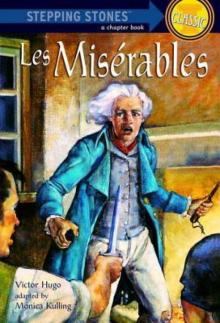 Les Miserables
Les Miserables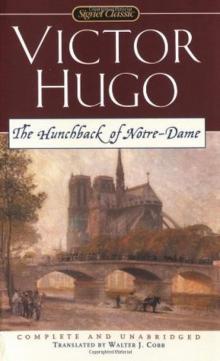 The Hunchback of Notre-Dame
The Hunchback of Notre-Dame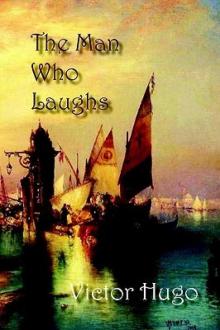 The Man Who Laughs
The Man Who Laughs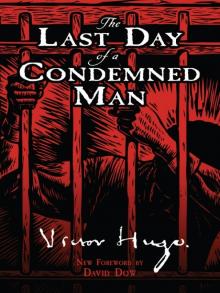 The Last Day of a Condemned Man
The Last Day of a Condemned Man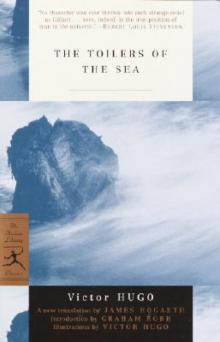 The Toilers of the Sea
The Toilers of the Sea Waterloo
Waterloo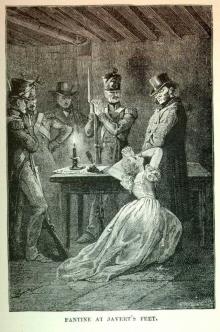 Les Misérables, v. 1/5: Fantine
Les Misérables, v. 1/5: Fantine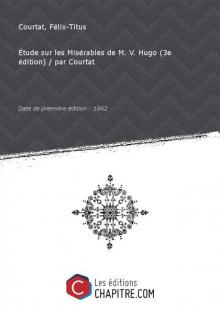 Les Misérables, v. 3/5: Marius
Les Misérables, v. 3/5: Marius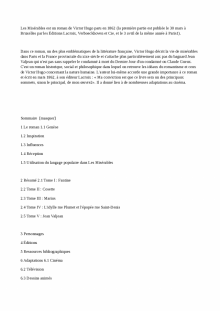 Les Misérables, v. 2/5: Cosette
Les Misérables, v. 2/5: Cosette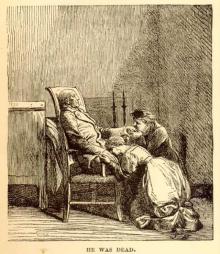 Les Misérables, v. 5/5: Jean Valjean
Les Misérables, v. 5/5: Jean Valjean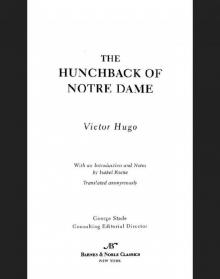 Hunchback of Notre Dame (Barnes & Noble Classics Series)
Hunchback of Notre Dame (Barnes & Noble Classics Series)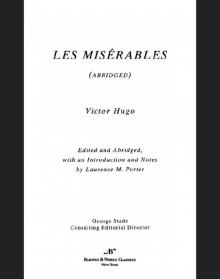 Les Miserables (abridged) (Barnes & Noble Classics Series)
Les Miserables (abridged) (Barnes & Noble Classics Series)